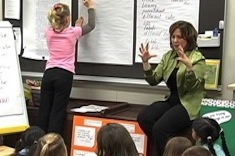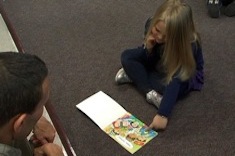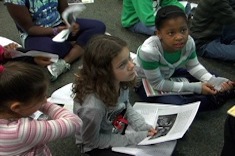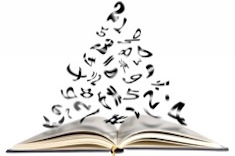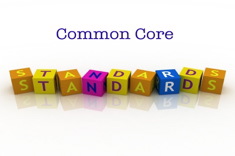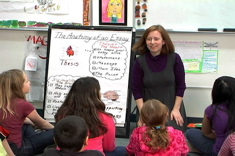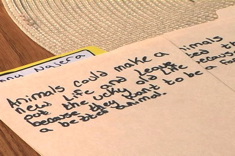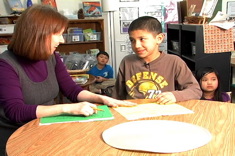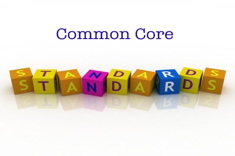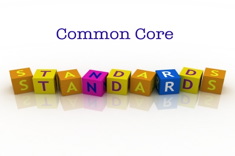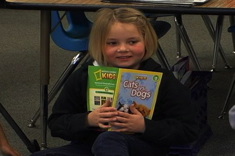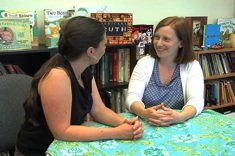Common Core
Teachers and school leaders have a sense of urgency in understanding and implementing the Common Core. We share the experiences of teachers as they wrestle with new definitions of persuasive writing in the Common Core and build their nonfiction libraries. We include many resources from literacy coaches and school leaders as they bring together teachers to discuss and try out the Common Core in their classrooms. Whether it's one teacher working with a few students, or a district looking to coordinate resources across hundreds of classrooms, we've got the materials you need to figure out how to integrate standards into your work while maintaining the integrity of your beliefs about literacy instruction.
Latest Content
Two Lessons for Teaching Theme
Franki Sibberson writes about how she chooses books for theme instruction and shares two lessons.
Exploring Explanatory Moves Writers Use
Jeff Anderson explores the difference between informational and explanatory writing, and what that might mean for teaching craft moves to students.
Research Book Clubs for Struggling Readers
Beth Lawson finds that a nonfiction research book club is just the grouping structure needed for a group of struggling readers in her fourth-grade classroom.
Creating Your Own Kindergarten Assessment
Max Brand finds standard assessments don’t always give him the information he needs when working with kindergarten English language learners, so he develops his own tool for analyzing book handling skills.
October Literacy Contracts: Fear and Conflict
Megan Ginther and Holly Mueller continue their monthly series on using literacy contracts in middle school. The October literacy contracts have a theme of fear and conflict.
Chris Lehman on Student Research (PODCAST)
Franki Sibberson chats with Chris Lehman (author of Energize Research Reading and Writing) about how the Common Core is changing the ways teachers approach student research in their classrooms.
“We Gather Together”: On Research and Weddings
Ruth Ayres and her colleagues use a marriage analogy to help middle school students and their families understand the research process. The article includes a nifty example of a pamphlet to share with parents.
Limiting and Extending Choice in Student Research Projects
When students are able to pick any research topic, they often will choose something they have already studied extensively. How can teachers allow students to pick topics for research they care passionately about and at the same time ensure there is the potential for rich inquiry? Maria Caplin describes the process she uses in her fifth-grade classroom to help students find and refine research topics for deeper learning.
Finding the “Ex” Factor in Explanatory Writing
Jeff Anderson launches a new series on explanatory writing, a topic of high interest to teachers now because of the Common Core.
Owl Research: Whole Class Explanation of Marking Up Text
Students are given a nonfiction text to mark up during a close reading with a partner in this video from Andrea Smith’s fourth-grade classroom.
Chris Lehman and Kate Roberts on Close Reading (PODCAST)
Franki Sibberson chats with Chris Lehman and Kate Roberts about close reading in this 30-minute podcast. Chris and Kate are the authors of Falling in Love with Close Reading: Lessons for Analyzing Texts — and Life from Heinemann.
How to Eat an Elephant One Bit(e) at a Time: Reading Complex Texts
Maggie Beattie Roberts and Kate Roberts present a step-by-step process for close reading in the middle and high school grades involving multiple passes through the same text.
Independent Reading By the Numbers Is NOT Text Complexity
How do you guide students to select books for independent summer reading? Aimee Buckner challenges teachers who are requiring middle students to pick books based solely on Lexile scores.
From “Show Me the Lessons” to Sustainable Planning (Part 4 of the Opinion/Argument Writing Series)
This is the final installment in Heather Rader's series on argument and opinion writing in the intermediate grades.
Thank You For Arguing
In the second installment of our teaching argument/opinion writing series, Heather Rader uses a continuum dialogue and modeled writing with intermediate students.
I Love a Good Argument
As Heather Rader works with teachers and teams on opinion/argumentative writing, she’s considering the anatomy of an argument and engaging ways to teach it.
Common Core Booklist: Writing Personal Narratives
Personal narratives are an important part of the Common Core in 4th grade. Franki Sibberson shares a booklist of some of her favorite mentor texts for teaching narratives in the intermediate grades.
Teaching Revision Through Talk, Routines, and Drawing
Clare Landrigan and Tammy Mulligan have some practical advice for using drawing, talk, and routines as ways into understanding writing revision for learners in the primary grades.
Unpacking the Kindergarten Common Core Standards
Mandy Robek shares five tips that can help teachers at any grade level develop strategies for tackling the Common Core.
Supporting Young Writers with Opinion Texts
Katie DiCesare considers how different texts at the primary level can support student understanding of standards for opinion and argumentative writing.
Chronology in Nonfiction (Common Core Booklist)
Franki Sibberson's latest Common Core booklist includes texts to help students master chronology in nonfiction.
Introducing the Common Core Standards in Writing (Part 2)
Heather Rader shares more guidelines for a professional development day on the Common Core with a writing focus.
Rethinking My Nonfiction Library in Response to the Common Core
Franki Sibberson finds a new classroom, the Common Core, and tech considerations are changing the ways she organizes the nonfiction sections of her classroom library.
Essay Writing: Thesis Statements and Supporting Details Minilesson
Beth Lawson works with her 4th graders to develop essays with strong thesis statements and supporting details, using a folder organization system to highlight different thesis statements for each child. This is the first video in a series.
Conferring About Thesis Statements
In this conference with a 4th grader, Beth Lawson talks about supporting details for thesis statements. This is part of the video series from Beth’s room on essay writing.
Stuck on a Thesis: Conferring
In this conference with a 4th grader, Beth Lawson works with a student who has chosen a challenging essay topic and is struggling to develop his thesis.
Common Core Conversations: Text Complexity
Amanda Adrian and Heather Rader find ways into understanding text complexity with students and teachers.
Perspective as a Component of Text Complexity: A Common Core Booklist
Franki Sibberson tackles the connections between text complexity and perspective in this Common Core booklist.
Previewing Nonfiction
Teachers are adding more nonfiction to their classroom libraries, and looking for ways to promote nonfiction with students in light of the emphasis on nonfiction in the Common Core. Franki Sibberson share tips for previewing nonfiction with students.
Mentor Texts for Nonfiction Writing
Beth Lawson and Heather Rader meet to plan and share mentor texts for nonfiction writing in Beth’s fourth-grade classroom.
Browse Content By
Type
Category
- Assessment Tools
- Big Fresh Archives
- Booklists
- Choice Numeracy
- Classroom Design
- Common Core
- Community Building
- Conferring
- Content Literacy
- Digital Literacy
- English Language Learners
- Equity
- Family Relations
- Free Samples
- Guiding Groups
- Leadership
- Literacy Coaches
- Mentor Texts
- Minilessons
- New Teacher Mentors
- Podcasts
- Poetry
- Quote Collections
- Reading Strategies
- Self Care
- Struggling and Striving Learners
- Talking and Listening
- Teacher Study Groups
- Teaching Reading
- Teaching Writing
- Word Study and Vocabulary
Author
- Melissa Quimby
- Nawal Qarooni
- Gwen Blumberg
- Julie Cox
- The Lead Learners
- Hannah Tills
- Josie Stewart
- Ruth Metcalfe
- Mallory Messenger
- Becca Burk
- Jodie Bailey
- Vivian Chen
- Mary Brower
- Tiffany Abbott Fuller
- Stephanie Affinito
- Ruth Ayres
- Leigh Anne Eck
- Heather Fisher
- Shari Frost
- Julie Johnson
- Suzy Kaback
- Gigi McAllister
- Shirl McPhillips
- Melanie Meehan
- Cathy Mere
- Debbie Miller
- Tara Barnett and Kate Mills
- Tammy Mulligan
- Dana Murphy
- Bitsy Parks
- David Pittman
- Brenda Power
- Heather Rader
- Matt Renwick
- Mandy Robek
- Christy Rush-Levine
- Gretchen Schroeder
- Jen Schwanke
- Brian Sepe
- Katherine Sokolowski
- Stella Villalba
- Jennifer Vincent
Grade Level
Choice Literacy Membership
Articles
Get full access to all Choice Literacy article content
Videos
Get full access to all Choice Literacy video content
Courses
Access Choice Literacy course curriculum and training

